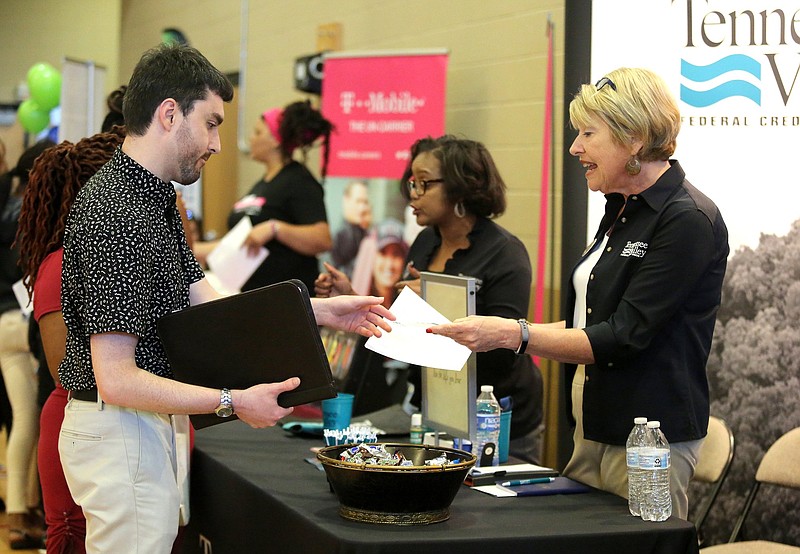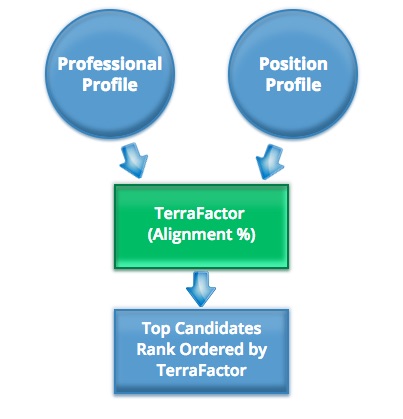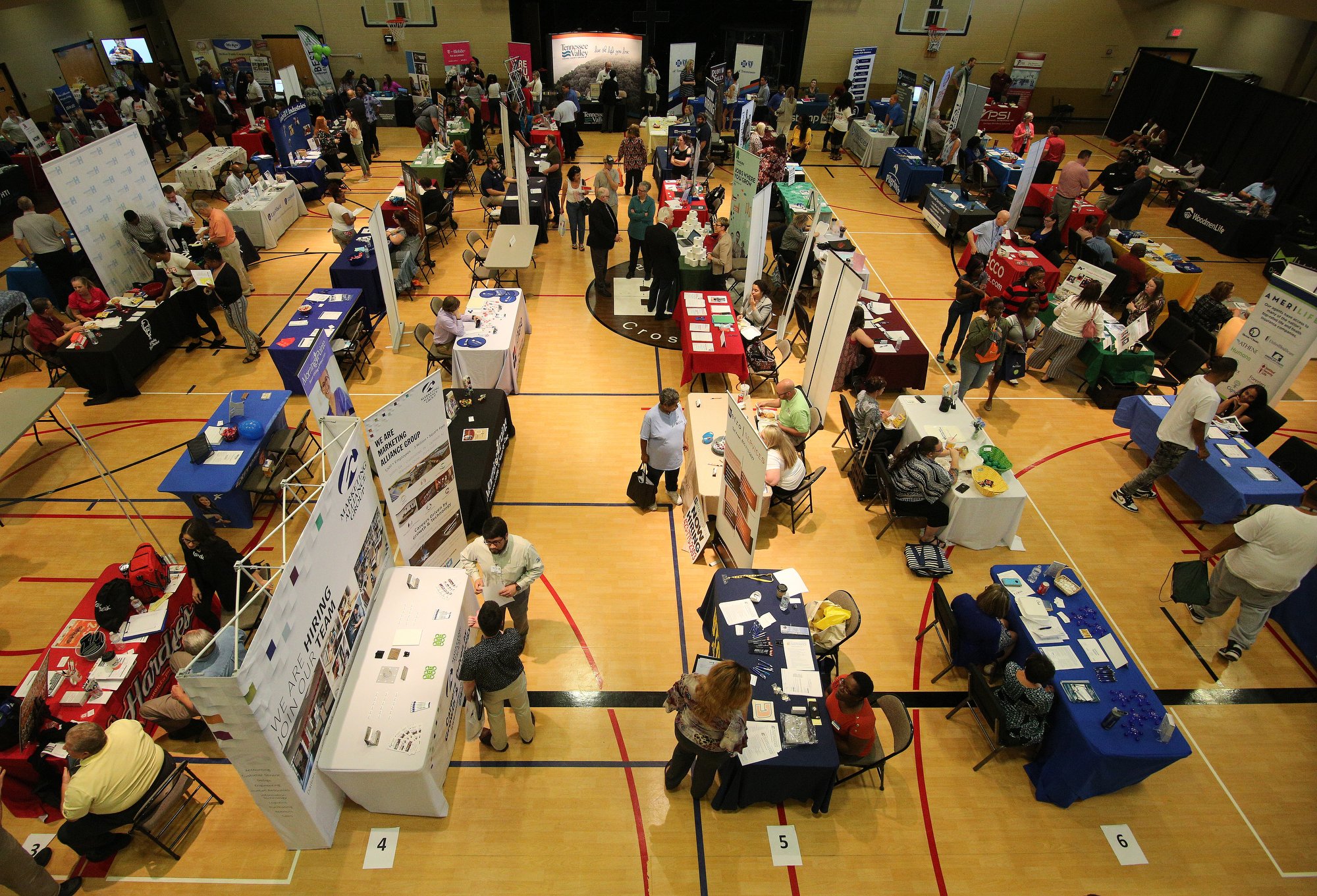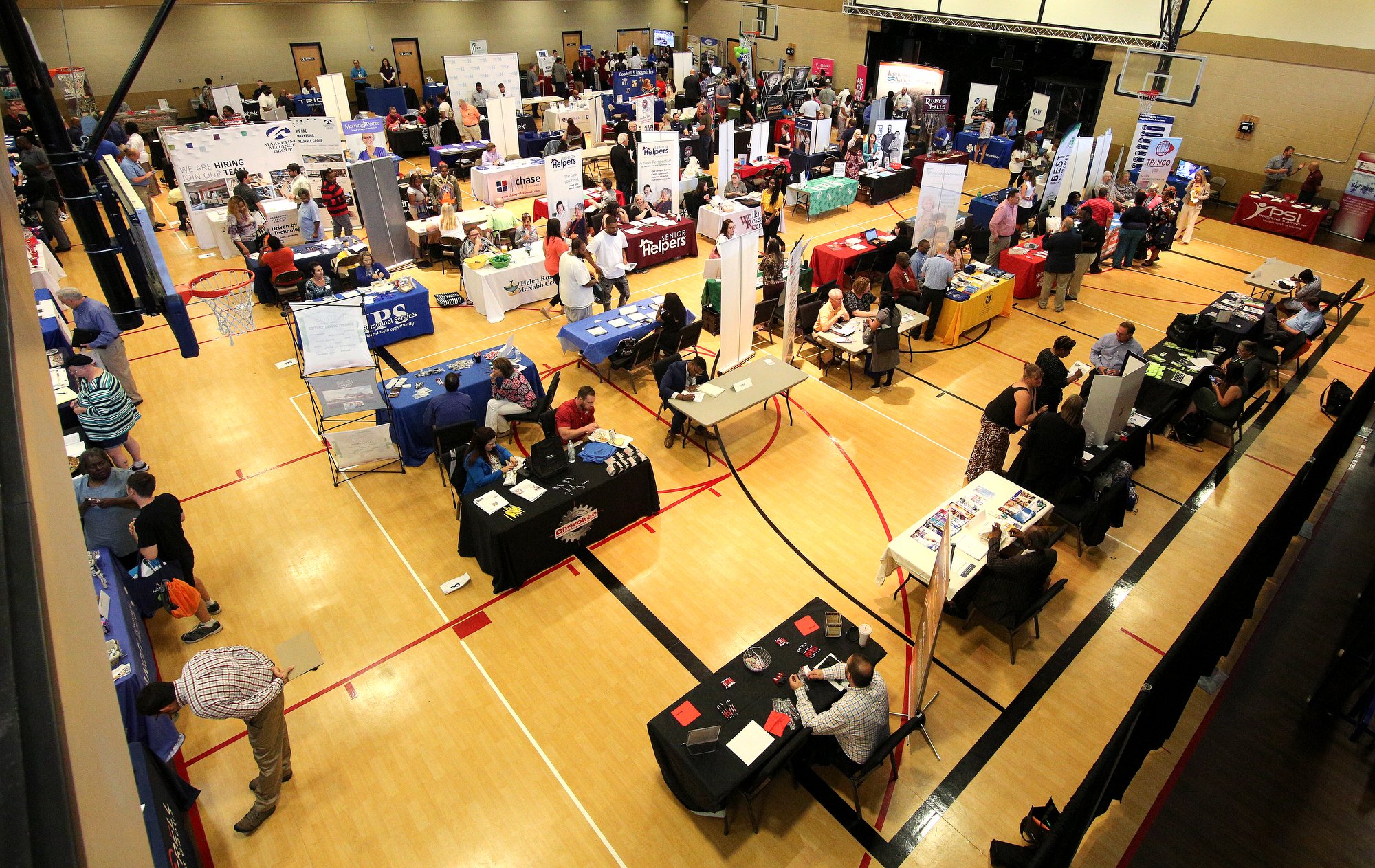Sean Booth recently mingled among the dozens of tables set up at a spring job fair, hoping to catch the eye of a prospective employer.
At the Chattanooga Area Chamber of Commerce's spring job fair earlier this month in Brainerd, the 29-year-old was looking for an opportunity that would cater to his bachelor's degree in history and well-tuned research skills.
The only problem though is that he has worked at a job the past three-and-a-half years that doesn't use this skill set, and it can be difficult to explain his job history online when he's just another resume among the dozens, hundreds or even thousands uploaded for one position. Booth explained that being face-to-face with a potential employer is much more appealing than uploading his resume online just so it can be tossed by some hiring manager - or machine - because it doesn't appear to have what a company is looking for in a candidate.
"I feel like that automatic screening process does not process things correctly sometimes," he said. "It reads something the wrong way or way too fast."
Using artificial intelligence in the job hiring process has become more of the norm rather than the exception, and many companies use some form of it whether it's more basic, like screening resumes for key words, or more sophisticated, like a program that analyzes an applicant's body language, tone and emotions in a video interview.
The rise of AI in job recruiting has been received with open arms by some and resistance by others, though. Some argue that AI can save recruiters' time by performing tedious processes, improving the applicant pool and removing selection bias. But others raise concerns about AI one day replacing recruiters and misperceiving certain data that a human might catch or question.
Chris Baumgartner said he turned to AI out of frustration from the hiring process during his career in health care management. In 2014, Baumgartner and his partners founded TerraTal, which is an online platform and "global talent exchange" that uses matchmaking technology and a "TerraFactor" percentage to connect job seekers and employers.
As president and co-founder of TerraTal, Baumgartner is in the process of moving the company to Chattanooga from Dallas, Texas. He says AI and machine learning will continue to grow in the recruiting and hiring space whether employers and job seekers want them to or not.
"The better and more sophisticated we can get it, the more opportunities there will be to hone that technology," he said. "I would say that if we embrace this area of technology - both from the professional and employer side - then the user experience will be much more productive and reliable."
Baumgartner said that with each new profile and job posting, TerraTal gets smarter and smarter. While he is still trying to recruit Chattanooga companies to post on the platform, TerraTal currently has over 250 registered clients or companies and about 15,000 professionals that have created a profile, he said.
Most of the jobs posted are in health care, information technology, sales, human resources and advanced leadership positions, but Baumgartner said he is seeing a rise in in postings that don't require an advanced degree. A majority of the roles posted are in Dallas or Charlotte, North Carolina.
TerraTal takes into account a candidate's geography, demographics, job history and education experience among other things. Employers can also use TerraTal to measure a candidates ability to perform in a certain work environment, Baumgartner said.
"Data shows that when someone takes a job where the environment is not good then they are almost immediately on the lookout for other jobs," he said. "That creates a hardship on employers."
According to Baumgartner, what makes TerraTal more unique than other platforms is that each employer can control the variables in the algorithm they use to select job candidates. When a job seeker and an employer express interest in one another, TerraTal provides a "TerraFactor" percentage that shows how well a candidate fits for the position based on their profile and the variables a company measures. A match over 90 percent means the person is a good candidate for the position.
For job seekers worried about being "weeded out" by AI, Baumgartner said if a person is not a good fit then they are going to get weeded out eventually regardless of the technology platform or process being used.
"The second best answer you can get is a quick no," he said. "Nobody wants to be working in an organization where they are going to be unhappy, unproductive and unsuccessful."
Moving the company from Dallas to Chattanooga was a natural fit mostly because Baumgartner was already living in the city, and with Chattanooga investing heavily in its digital infrastructure with EPB and fiber optic internet, he said the talent pool and environment was conducive for growing TerraTal.
"It just made sense," he said. "It's just one of those places that has a very unique culture and ambiance that is very attractive to young professionals who want to take the next step."
'The dark arts of resume development'
Higher education institutions are typically not the quickest to adapt to changing trends because of longstanding, venerated traditions. But University Career Services director Robert Liddell and the other career counselors at the University of Tennessee at Chattanooga are trying to respond to the newest technology and effects of automation.
Liddell said he and other counselors spend a lot of time talking about resume development with students, teaching them how to enhance their resumes for AI.
There are several good tips out there for resume development that have withstood the test of time, like incorporating key words from the job posting into the resume, but there's also advice out there that Liddell doesn't exactly endorse.
"There's the dark arts of resume development out there where you create this footer at the bottom of your resume and in white font you put in all kinds of crazy key words," he explained.
While Liddell has some hesitations about artificial intelligence in the employment process, he doesn't see it as some kind of "apocalyptic end game" with humans one day facing off against robots, he said.
At UTC, and more than 700 university career centers around the country, students can use an online platform called Handshake, which was started by college students who wanted to "democratize opportunity." They were tired of large tech companies, like Microsoft and Google, looking in the same networks for potential employees. The system is meant to level the playing field for the 14 million students and young alumni that use it, according to Liddell.
Liddell compared the platform to a Netflix or Spotify account where a student creates a profile and states what they are interested in and Handshake shows them similar jobs or jobs that use similar skills that maybe the student hadn't thought of applying for yet. There are more than 300,000 employers on Handshake.
"With artificial intelligence, you get an idea to develop and expand a set of solutions probably just beyond the reach of your own consciousness, and that's super exciting to me," he said.
AI: The sidekick
Speaking from personal experience, Liddell said there's not a surplus of middle management positions in Chattanooga, which can mean hundreds of applicants for one position that maybe don't align with the job at all. Liddell remembers posting a position for the career services department, and 144 applied, but they were able to cut out about 110 applicants quickly, he said.
"I really think that when you are doing volume hiring – you want to use technology to make sense of it, " he said. "If you can cut down 60-70% of your applicant pool to what you find to be the most representative of a match then I think technology can be that great sidekick to augment your productivity."
Liddell cautions that while AI can make things easier and seemingly stop selection bias in the hiring process, it might actually add to bias and errors, too.
"AI is powerful and it's impacting almost every sector of our economy, but it's not human," he said. "It does have difficulty with nuance, and it can be tripped up by some complexities and irregularities. However, I think with some thoughtfulness we can use it to help mitigate some of that selection bias."
Baumgartner sees AI and platforms like TerraTal only making the hiring process more efficient for recruiters, he said. AI takes care of the scientific component while hiring managers are still left to the "art" component of hiring.
"It's never going to completely replace the human intellect when it comes to evaluating the emotional, and what I call, 'the personality traits' of the interview process," he said. "There's only so much you can determine from the science, but at the end of the day you have to make a decision if this is someone you want to cultivate into your work environment."
Liddell advises his students and others that it's important to not fear the future but to prepare for it.
"There's both this push toward automation and push to humanize," he said. "As we can balance this, I think we've got a real shot."
Contact staff writer Allison Shirk Collins at ashirk@timesfreepress.com, @AllisonSCollins or 423-757-6651.



